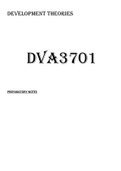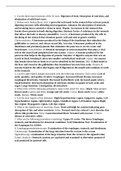Class notes
DVA3701 NOTES PACKS
- Institution
- University Of South Africa (Unisa)
DVA3701 This document has a summary of notes that will help you to prepare for your upcoming 2021 October - November exam. Refer also to your trusted text books. Use previous exam papers, assignments memorandums, as well as group discussion. Best of luck.
[Show more]




